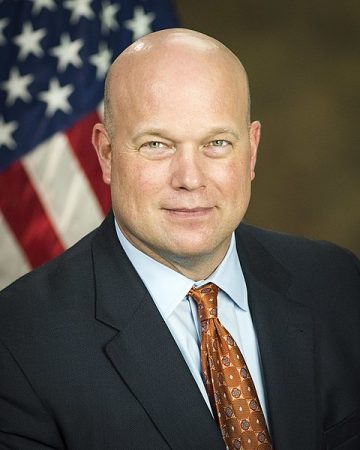DAYS, WEEKS, MONTHS OR YEARS MORE?
by Sharon Rondeau

(Jan. 28, 2019) — On Monday afternoon, during a press conference in which he reported that the Justice Department would file criminal charges against Chinese telecommunications company Huawei, Acting Attorney General Matthew Whitaker responded to a journalist’s question about the Mueller probe by stating that he believes the latter is in its final stages.
Whitaker, FBI Director Christopher Wray and Commerce Secretary Wilbur Ross made the announcement as to Huawei, and Whitaker’s arguably surprising response as to the status of the Mueller investigation was a result of the reporter asking if he were conflicted in overseeing Mueller because of comments he made when employed as a CNN commentator.
A transcript of the presser is posted at the Justice Department’s website but does not include reporters’ questions afterward.
A former chief of staff to former Attorney General Jeff Sessions, President Trump nominated Whitaker as Acting AG after Sessions’s swift departure the day after the midterm elections at Trump’s request.
Much speculation has abounded regarding Mueller’s work, which Whitaker has not discussed since his decision not to recuse himself from overseeing Mueller, for which he has been criticized by many in the media.
Earlier on Monday, Fox News Senior Judicial Analyst Andrew Napolitano speculated that Friday’s arrest of longtime Trump confidant Roger Stone indicated that the Mueller probe would continue at least through the 2020 campaign primary season. Stone was indicted by a grand jury for allegedly lying to Congress and obstructing justice during questioning about any contacts he had with WikiLeaks in 2016.
Napolitano’s statement was based on information he said he gleaned from sources that Stone’s trial will be held in approximately a year.
Some analysts believe that Mueller was compromised from the outset for a number of reasons, not the least of which that he was appointed by Deputy Attorney General Rod Rosenstein, who is reportedly a witness to some of the events under scrutiny. Rosenstein tasked Mueller with discovering to what extent, if any, Russia influenced the 2016 U.S. elections and whether or not anyone from the Trump campaign “colluded” with Russians to win the election over Democrat Hillary Clinton.
Rosenstein, Mueller and former FBI Director James Comey were all professionally acquainted prior to Mueller’s installation as Special Counsel, and Comey’s actions as well as those of his subordinates were scrutinized by Justice Department Inspector General Michael Horowitz.
In a memo never fully released to Congress, Rosenstein appeared to broaden Mueller’s assignment to include a criminal investigation of former Trump campaign manager Paul Manafort, who eventually pleaded “guilty” to charges associated with his overseas consulting business.
To date, no one has been charged with “colluding” with Russians or other parties, although more than two dozen Russian individuals and entities have been indicted for election interference.
In his remarks Monday, Whitaker expressed a desire to review the report Mueller is expected to produce, but he did not commit to making it public, an issue which congressional Democrats have previously said they will pursue.
Democrats have generally vowed to “protect” Mueller’s probe, while many Republicans believe the 20-month endeavor should be brought to a swift conclusion.
Because Whitaker was not confirmed by the Senate, Trump nominated William P. Barr to be the next attorney general, a post Barr held during the latter part of the George H. W. Bush presidency. On Monday, follow-up answers to questions stemming from his confirmation hearings on January 16 and 17 were released publicly by the Senate Judiciary Committee.

